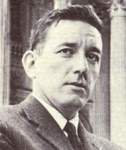Gene Smith
Gene Smith was a notable popular historian and long-time contributor to American Heritage who passed away in 2012 at the age of 83. Smith wrote many biographies of American political and military leaders, including the 1964 New York Times bestseller When the Cheering Stopped: The Last Years of Woodrow Wilson.
Of Mr. Smith’s 19 books, perhaps the next best-known is The Shattered Dream: Herbert Hoover and the Great Depression (1970). He portrayed Hoover as an honest, caring president trapped by circumstances beyond his powers, and also by his own reserve and cautiousness.
“President Hoover could not bear to see the bread lines or the thin children so remindful of Europe in the war,” Mr. Smith wrote. “He never went to the relief stations, never turned his head in the car to look at the men selling apples on the street corners.”
At the same time, Hoover “took no precipitate steps,” Mr. Smith wrote, “saying that the most dangerous thing in the world was a man with emotion but no ideas.”
Among Mr. Smith’s other books are High Crimes and Misdemeanors: The Impeachment and Trial of Andrew Johnson, Lee and Grant: A Dual Biography, and Until the Last Trumpet Sounds: The Life of General of the Armies John J. Pershing (1998), a study of the commander of the American Expeditionary Force of World War I. His last book, Mounted Warriors: From Alexander the Great and Cromwell to Stuart, Sheridan and Custer (2009), is a history of the cavalry.
After graduating from the University of Wisconsin with a degree in history, Smith briefly attended law school. He was drafted into the Army and served in Germany in the early 1950s. After returning to New York, Smith worked at Newsweek, The Newark Star-Ledger, and The New York Post.
Recently, Mr. Smith wrote a brief obituary of himself, in third-person singular. It says, “He used to muse that if there was an afterlife — granted a long shot, he said — he’d love it for the opportunities offered to interview people he studied in life.”






